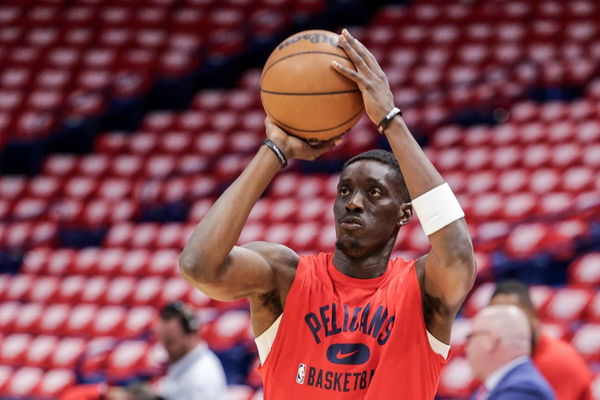
via Imago
Apr 24, 2022; New Orleans, Louisiana, USA; New Orleans Pelicans forward Tony Snell (21) at warms up before game four of the first round for the 2022 NBA playoffs at Smoothie King Center against the Phoenix Suns. Mandatory Credit: Stephen Lew-Imagn Images

via Imago
Apr 24, 2022; New Orleans, Louisiana, USA; New Orleans Pelicans forward Tony Snell (21) at warms up before game four of the first round for the 2022 NBA playoffs at Smoothie King Center against the Phoenix Suns. Mandatory Credit: Stephen Lew-Imagn Images
Teams spend time scouting talent, assessing skills, and digging into players’ backgrounds, yet mid-season trades often boil down to numbers. Imagine how that feels—your career and life suddenly uprooted because your salary fits a trade equation. For these athletes, the shift isn’t just professional; it’s deeply personal, leaving their futures uncertain while front offices focus on the financials. “I’m hoping — you know, the NBA’s been great to all of us sitting up here — I hope one of you guys sign Tony so his two autistic kids can get great medical care.” This was Charles Barkley’s plea for any team in the league to sign Tony Snell in February.
The NBA’s trade deadline period is focused on superstars making moves or franchises pulling off insane trades. But last February it wasn’t the superstars who were in focus. It was about a role player who was in the G League. Though the G League isn’t the only route to the NBA. Representing your nation can also work. That might just be the route Tony Snell is now taking.
He has been called up for Team USA men’s AmeriCup qualifying team. The FIBA AmeriCup is a regional basketball tournament for the countries in the Americas as well as the Caribbean. An exciting tournament. However, Snell’s NBA career wasn’t bad at all. In 2021, he made history as the first player to achieve a 50–50–100 season (minimum of 100 attempts). He posted 51.5% shooting from the field, a remarkable 56.9% from 3-point range, and a perfect 100% free throws. But why is the media’s attention on Tony Snell?
ADVERTISEMENT
Article continues below this ad
After nine years in the NBA, the former Bucks player is just one season away from unlocking premium retirement benefits. Reaching 10 years of service under the Collective Bargaining Agreement would provide lifetime health insurance not just for him, but for his family as well—a critical support given his personal circumstances. Both of his sons, Karter and Kenzo, have been diagnosed with autism spectrum disorder. Snell, too, has received the same diagnosis, as per CBS Sports.

USA Today via Reuters
Mar 9, 2022; New Orleans, Louisiana, USA; New Orleans Pelicans forward Tony Snell (21) reacts to a play against the Orlando Magic during the first quarter at Smoothie King Center. Mandatory Credit: Andrew Wevers-USA TODAY Sports
The NBA structures its retirement benefits in two levels. Players with 3 years of service receive lifetime health insurance, but the 10-year threshold extends coverage to their families. To secure his 10th season, Snell has been playing with the G-League’s Sioux Falls Skyforce, hoping an NBA team would sign him. The CBA requires Snell to play 50% of games to access retirement benefits.
But teams willing to help him, face restrictions, making it impossible to sign the seasoned hoopster. Despite their goodwill, the 50% rule leaves Snell in a difficult situation. However, a glimmer of hope appears, as Tony Snell was recently part of the November 2024 USA Men’s AmeriCup Qualifying Team. Looks like he is doing everything in his power to secure an NBA contract once again! Did you know that the AmeriCup since changing its format, has become even more exciting? Let us dive into it.
ADVERTISEMENT
Article continues below this ad
What is the FIBA AmeriCup? Bringing out regional hoops pride!
The FIBA AmeriCup, previously called the FIBA Americas Championship, is a key basketball tournament for nations in the Americas, including North, Central, and South America, as well as the Caribbean. It’s a stage where regional rivalries play out and talents shine, making it an exciting event for basketball fans. You might find it interesting that until 2015, this tournament doubled as a qualifier for the FIBA World Cup and the Olympics. Back then, it was held every two years, so it carried a lot of weight.
What’s your perspective on:
Should NBA teams prioritize player welfare over financials, especially in cases like Tony Snell's?
Have an interesting take?
📸 The November 2024 USA Men’s AmeriCup Qualifying Team
🇺🇸 #AmeriCup pic.twitter.com/nHIBB57yGE
— USA Basketball (@usabasketball) November 20, 2024
ADVERTISEMENT
Article continues below this ad
But starting in 2017, FIBA decided to switch things up. Now, the AmeriCup happens every four years and serves purely as a continental championship. The qualifiers for the 2025 edition, for instance, are already underway, with teams battling across home-and-away games for a coveted spot. Nicaragua will even host the next tournament—a big deal for them!
The shift from being a qualifier to a standalone championship might seem like it lowers the stakes, but it actually allows the event to focus more on regional basketball pride. It’s also fun to see how different styles of play come together, blending athleticism and strategy unique to each region. What do you think about tournaments like these focusing solely on the hoop instead of being a feeder tournament?
ADVERTISEMENT
ADVERTISEMENT
ADVERTISEMENT
ADVERTISEMENT


Should NBA teams prioritize player welfare over financials, especially in cases like Tony Snell's?